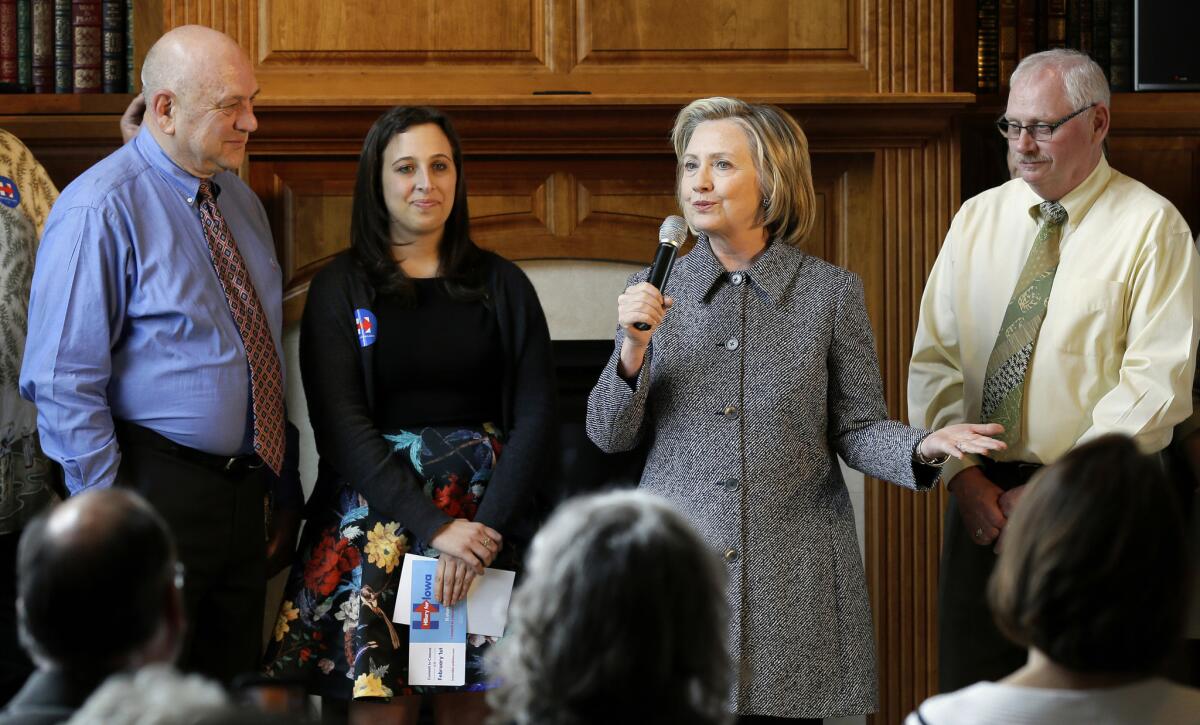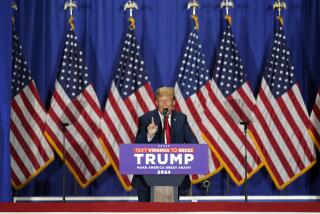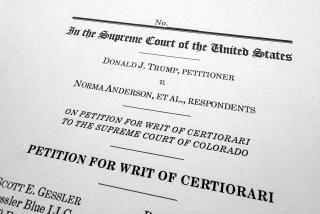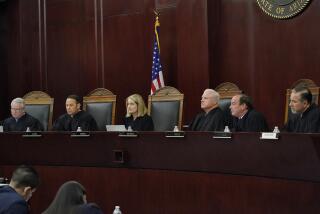Clinton says she’d make Supreme Court picks aimed at campaign finance reform

Hillary Rodham Clinton talks to supporters at a home in Mason City, Iowa.
Hillary Rodham Clinton was clear Monday during a campaign stop about one quality she would expect from her nominees to the U.S. Supreme Court if she were to become president – an overhaul of the rapidly evolving campaign finance system that is giving extremely wealthy donors ever more say in presidential contests.
Her position was remarkable for a candidate positioned to shatter fundraising records and push the boundaries of campaign finance law further than any Democrat who has ever run for the White House.
“The Supreme Court made a grave error with Citizens United,” Clinton said before a roomful of party activists in Mason City, Iowa. “I will do everything I can to appoint Supreme Court justices who protect the right to vote and do not protect the right of billionaires to buy elections.”
Clinton has made rolling back the court’s controversial 2010 campaign finance law decision – which enables corporations and unions to spend unlimited amounts to influence an election – a key pillar of her campaign. She talks about it frequently, lamenting the corrupting influence of big money in politics.
But lately her talk has been shifting in a way that significantly ratchets up her public opposition to the court’s decision. Her call for a constitutional amendment to reverse it, something that is highly unlikely to happen because it would require a two-thirds vote in both houses of Congress and approval of three-quarters of the states, is giving way to talk of the type of Supreme Court justice she would appoint.
If elected president, she would probably have a chance to put new justices on the high court. Two of the justices in the 5-4 majority in Citizens United, Anthony M. Kennedy and Antonin Scalia, are 78 and 79, respectively.
The 2010 ruling held that advocacy groups had a 1st Amendment right to spend unlimited sums on political activity. The decision wiped out 60 years of campaign finance restrictions that Congress had passed in efforts to restrict the ability of large donors and interest groups to affect the political process. A series of follow-up decisions by lower courts have struck down other restrictions, making campaign spending effectively unlimited.
Candidates in both parties have quickly learned to compete under the new rules and take advantage of the many opportunities to bring in big-dollar donations. But among Democratic activists, the decision has been widely denounced as a prime example of tilting the political playing field toward the interests of the rich. Pledges to overturn Citizens United have become staples of Democratic campaign rhetoric.
Polls have indicated that campaign finance reform is a low priority for most voters, but has considerable salience among liberal Democrats. Some Democratic strategists also argue that the issue can have more impact with a broader swath of voters if it is presented as part of an overall push to reform the country’s political process, which large numbers of Americans see as dysfunctional.
Campaign finance reform groups remain wary of Clinton’s activism on the issue. Some question her commitment at a time she is actively seeking to exploit the very loopholes she claims are corroding democracy. The candidate has told donors that she will actively be raising money for the Priorities USA Action “super PAC,” a group that is using lax campaign finance law enforcement to raise unlimited donations. In 2012, campaigns avoided any similar coordination with such groups. Priorities USA is seeking to raise $200 million to $300 million, most of which is expected to come from very wealthy donors.
Democrats counter that Clinton is caught up in a campaign cash arms race that the GOP has escalated. Jeb Bush, who has yet to formally announce his candidacy, began coordinating with his super PAC to raise millions of dollars for an eventual run for office before Clinton made her move.
Clinton says rolling back Citizens United is more than a talking point for her. She went into detail during her campaign stop Monday, telling a group of 60 or so supporters gathered in a living room that she has been talking to legal experts, and that they are split on whether anything can be done short of a reversal by the court or a constitutional amendment. She said that while some experts believe Congress could pass legislation to restore some of the old rules, that is not the thinking of retired Supreme Court Justice John Paul Stevens, who was on the court when the case was argued and sided with the minority.
Halper reported from Mason City and Lauter from Washington.
For more Washington coverage, follow @ehalper
More to Read
Get the L.A. Times Politics newsletter
Deeply reported insights into legislation, politics and policy from Sacramento, Washington and beyond. In your inbox three times per week.
You may occasionally receive promotional content from the Los Angeles Times.








